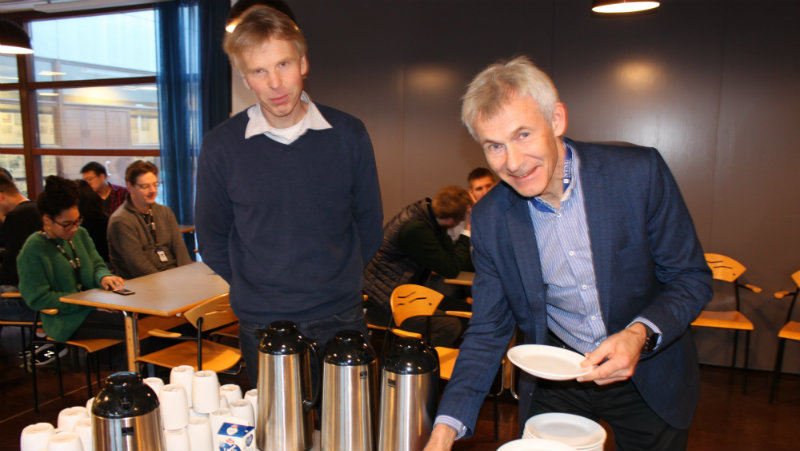Development concept for Ocean Space Centre is decided
Development concept for Ocean Space Centre is decided
The Norwegian government have decided to continue the work on realising the Ocean Space Centre in Trondheim. The goal is to ensure that Norwegian ocean industry remains competitive, also in the future. The quality control process made it clear that the project is economically viable, and the project is now entering a new phase.

This was announce by the Norwegian Ministry of Trade, Industry and Fisheries today.
When completed, the Ocean Space Centre will be a modern and forward-looking centre for science, innovation, and education within the ocean space field.
Planning for Ocean Space Centre started in 2005, and since then different concepts have been considered. In March 2018, NTNU and SINTEF put forward a modified concept, which has now passed government control.
Deemed economically profitable
The quality control shows that the concept is profitable, and based on this, the Norwegian government have decided to advance the project to the OFP phase. In this phase, important elements connected to the cost of the project will be decided.
- This is an important stepping-stone. We now have a good, robust concept, but planning for Ocean Space Centre have taken a long time, and the current laboratories are becoming outdated and worn-down. It is therefore imperative that the project is realised as quickly as possible, if Norway is to maintain its position as leading maritime nation, says president and CEO of SINTEF, Alexandra Bech Gjørv.
The revised concept for Ocean Space Centre has reduced both investment and operating costs compared to earlier proposals. New functionalities have been included, such as better interaction between laboratories, simulations, and digital instruments that measure and continuously report from full-scale fjord-laboratories. Better solutions for interaction between education and research have been prioritised.
Quality control shows that the chosen concept will allow SINTEF Ocean and NTNU to increase both income and research quality, and that this will more than outweigh the cost of investment.
- In order to remain competitive we have to produce graduates with the relevant knowledge and skill necessary for tomorrow’s ocean industries. Solutions that allow education to work together with research is vital, and together with SINTEF, we now have a concept that delivers on this front. We are happy that this has been emphasised when the project’s benefits for society was considered, says rector at NTNU, Gunar Bovim.
Vital for future jobs
Development of the ocean industries within petroleum, maritime, and seafood is one of the most vital areas for restructuring the Norwegian job-market. This requires that we develop the knowledge and capacity necessary for realising these goals. The OECD have stated that ocean-based industries have the potential to surpass the growth of the global economy, concerning both economic growth and job-creation. By creating a world-leading centre of knowledge, Norway can keep its position as a technology based maritime nation, and lay the foundations for growth within the ocean industries. OECD (OECD’s Ocean Economy 2030 (2016)) predicts that new ocean-based industries will emerge in the coming years. These new industries will be fuelled by population growth, new technology, higher levels of prosperity, the need for new sources of energy, and as a response to climate change.
Laboratories and digitalisation
We are currently experiencing rapid technological developments that are increasing our knowledge of the Oceans. Foremost among them are developments connected to digitalisation and BigData. Nevertheless, advanced real-world laboratories will still be necessary. By combining these approaches to science, and focusing upon interaction between physical laboratories, simulations, and a continuous stream of data from ocean based operations and sensors, we gain a more complete picture than we otherwise would.
In the Ocean Space Centre, simulations will be combined with experiments using models, in order to prevent accidents and damage to the environment. Robotics and autonomous systems must be developed and tested in a controlled environment before they can be put to use.
- We are now one step closer to realising the ocean space laboratories of tomorrow. This is a good day for the scientific community at Tyholt. Ocean Space Centre will, when completed, ensure that our students and researchers have access to top-modern facilities, and this will lay the foundations that will ensure that ocean-, and marine technology research at NTNU will remain world-class. The existing infrastructure does not fulfil all of these requirements. Without new functionalities, we risk that one of the world leading academic communities within the field of marine technology withers, says the head of the Department of Marine Technology at NTNU, Sverre Steen.
 Head of IMT, Sverre Steen, and the dean of the Faculty of Engineering, Olav Bolland, cut the cake when the news came.
Head of IMT, Sverre Steen, and the dean of the Faculty of Engineering, Olav Bolland, cut the cake when the news came.Below is a video from the press conference.
